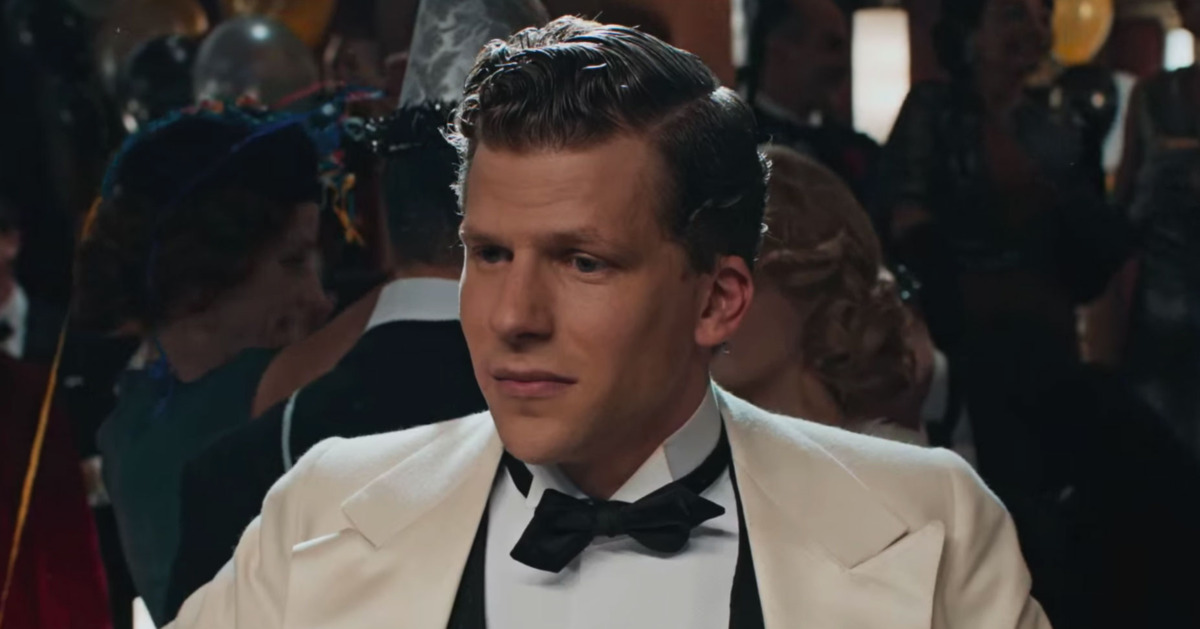You have just read a blog post written by Jason McIntosh.
If you wish, you can visit the rest of the blog, or subscribe to it via RSS. You can also find Jason on Twitter, or send him an email.
Thank you kindly for your time and attention today.

I enjoyed this film’s premise and setting far more than its totality. After a mutual nose-holding ceremony to acknowledge our cognizance of the movie’s baggage-laden creator, my partner and I entered the Jane Pickens hoping for something like the relaxingly whimsical fantasia of Midnight in Paris, the last Woody Allen picture we saw together. Café Society, alas, fell short, despite a similar indulgence in fondness for things past. I couldn’t see past a fundamental mismatch between tone and content.
The protagonist, young Bobby Dorfman, adds a twist to a the trope of a naive kid right off the bus in 1930s Hollywood: he is an experienced and irrepressible horndog. After the requisite opening montage where job-hunting Bobby receives the cold shoulder from too-busy studio executives, he decides to relax by hiring a prostitute, and does so with the nonchalance of someone ordering a pizza. I appreciate stories that skip off the formula, certainly, but the tone of the ensuing scene where he berates the poor working-girl to tears and then bum-rushes her out of his hotel room made me instantly dislike our hero, and all the more since the movie clearly wanted me to laugh the whole time. Nothing he did for rest of the story improved my mood towards him, and that includes the depiction of his wooing two other women by badgering them from the moment they meet.
As a character concept, I can certainly envision “naive boy in young Hollywood who really likes ladies a lot” as something that could work fantastically well, and I did appreciate the intentionally absurd love triangle at the core of the story. But I couldn’t stand Bobby, and that made it very hard to like the rest of the movie. I enjoyed The Social Network and I haven’t seen any other movies starring Jesse Eisenberg, so I won’t lay any fault with him. Unavoidably, the character’s behavior brought to mind what I know (and what has been alleged) about the director’s own sexual history, and this put me off even more. Maybe someone else can try again with these same elements, someday, and end up with a memorable, lovable-loser protagonist this film seemed to want, rather than a manic slimeball. (Having a love-interest less of a doormat than Kristen Stewart’s gorgeous but powerless Vonnie wouldn’t hurt, either.)
Perhaps the movie means to accurately represent how much truly awful stuff men with a modicum of power could get away with in interbellum America. Bobby may start out broke and alone, but he works family connections to find success and influence in short order, and at no point does he truly pay for anything. This may have invited in my other great source of negative thoughts while I watched the picture: that the beautiful people in their glamorous clubs depicted true decadence in a much more literal sense than intended, that the story’s time-setting is not so much “the 1930s” as some of the final years of humanity’s unquestioned mastery of the earth. One could watch it with full knowledge that its Hollywood threatens to dry out into uninhabitability, and its Manhattan become unlivably underwater, within a single century of its setting.
I think, perhaps, I saw a little too much of our civilization’s own naive trajectory in Bobby, where after years of consequence-free rapaciousness, realization and regret strike him all at once in the final scene. While music and laughter sound all around him, he stands frozen in place, able to at last see and contemplate the enormity of his actions for just a few last moments before the closing credits roll.
To share a response that links to this page from somewhere else on the web, paste its URL here.